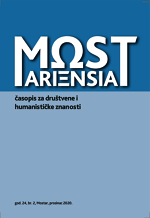HRVATSKE MIGRANTSKE MREŽE: PRISTUP PRIPOVJEDNE POVIJESTI U ISTRAŽIVANJU „GASTARBAJTERSKE ERE“ ISELJAVANJA
CROATIAN MIGRANT NETWORKS: AN ORAL HISTORY APPROACH IN EXPLORING THE “GASTARBEITER ERA” OF EMIGRATION
Author(s): Tado Jurić, Ante VujevićSubject(s): Oral history, Sociology of Culture, Migration Studies, Sociology of Politics
Published by: Sveučilište u Mostaru i Institut društvenih znanosti Ivo Pilar, Zagreb
Keywords: migrant networks; emigration from Bosnia and Herzegovina; emigration to Germany; oral history; guest workers (Gastarbeiters);
Summary/Abstract: Rising unemployment, poor living standards, and general lack of prospects, but also political reasons were the main drivers of emigration from Yugoslavia during the 1960s and 1970s. The focus of this paper is on emigration to Germany from Herzegovina as the region with the highest emigration rate during the communist Yugoslav political framework. Due to the huge need for the workers and due to the developed migrant networks (family-based or other) the majority of the emigrants decided to go to the Federal Republic of Germany. After their arrival the emigrants are faced with numerous problems, that this paper discusses. The paper is based on the method of oral history and the narrative of six narrators with the aim of acquiring an ethnological and cultural-anthropological picture of the life of the then emigrants, who are in this paper equivalent to the term “Gastarbeiters“. One of the aims of the paper is to unveil causes, consequences and motivation for the emigration from the communist Yugoslavia to the Federal Republic of Germany in the period 1960 till 1973 as well as to depict everyday life of the emigrants in Germany. The conclusion of the paper is that the branched Croatian migrant networks were one of the main incentives for the emigration of Croats to Germany.
Journal: Mostariensia - časopis za društvene i humanističke znanosti
- Issue Year: 24/2020
- Issue No: 2
- Page Range: 7-31
- Page Count: 25
- Language: Croatian

